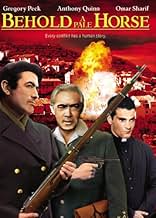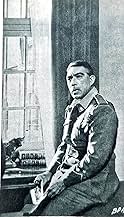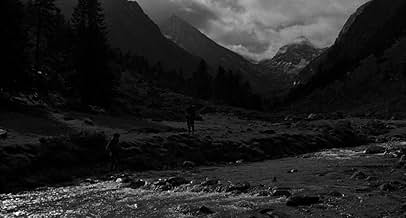NOTE IMDb
6,7/10
2,4 k
MA NOTE
Le célèbre bandit espagnol Artiguez retourne dans son village espagnol natal après 20 ans d'exil en France, mais le flic espagnol Vinolas lui tend un piège.Le célèbre bandit espagnol Artiguez retourne dans son village espagnol natal après 20 ans d'exil en France, mais le flic espagnol Vinolas lui tend un piège.Le célèbre bandit espagnol Artiguez retourne dans son village espagnol natal après 20 ans d'exil en France, mais le flic espagnol Vinolas lui tend un piège.
- Réalisation
- Scénario
- Casting principal
Marietto
- Paco Dages
- (as Marietto Angeletti)
Perrette Pradier
- Maria, Hussy
- (as Perette Pradier)
Avis à la une
8wilp
I saw this film years ago and it made a deep impression (even if my interest in the Spanish War does bias me in its favour); it's on my short list of works to locate and see again. Its treatment of generations and of legacies is as relevant as ever, now that the number of people living who witnessed that upheaval is shrinking fast. The film will move boys (who can identify with one of the main characters) and will not deprave them with violence, the little violence (if I remember correctly) being more suggestive than explicit. A psychological film with some intensely aesthetic moments.
I had been looking forward to this one for some time, due to its rather imposing credentials; it's certainly well-made and acted but also heavy-going, slow and excessively talky.
Gregory Peck is even stiffer and glummer than usual as a washed-out guerrilla fighter; Anthony Quinn is generally more subdued than is customary for him, being effectively cast against type as Peck's nemesis (though his character is completely absent from the film's mid-section); after a belated entrance, Omar Sharif manages to steal the acting honors from under the nose of his more experienced companions by giving a moving portrayal of a conflicted priest. The excellent cast is rounded out by Paolo Stoppa, Christian Marquand, Daniela Rocca, Mildred Dunnock, Rosalie Crutchley and Michel Lonsdale.
Ultimately, the film lacks the touch of greatness but the unusual subject matter (adapted from an Emeric Pressburger novel) and the surprising but affecting child's eye view it takes of events keep one watching. Furthermore, the climactic assault on the hospital is both suspenseful and exciting and the ever-reliable Maurice Jarre contributes a subtly effective score.
Gregory Peck is even stiffer and glummer than usual as a washed-out guerrilla fighter; Anthony Quinn is generally more subdued than is customary for him, being effectively cast against type as Peck's nemesis (though his character is completely absent from the film's mid-section); after a belated entrance, Omar Sharif manages to steal the acting honors from under the nose of his more experienced companions by giving a moving portrayal of a conflicted priest. The excellent cast is rounded out by Paolo Stoppa, Christian Marquand, Daniela Rocca, Mildred Dunnock, Rosalie Crutchley and Michel Lonsdale.
Ultimately, the film lacks the touch of greatness but the unusual subject matter (adapted from an Emeric Pressburger novel) and the surprising but affecting child's eye view it takes of events keep one watching. Furthermore, the climactic assault on the hospital is both suspenseful and exciting and the ever-reliable Maurice Jarre contributes a subtly effective score.
In 1939 like John Wayne's Ethan Edwards in The Searchers, Gregory Peck does not believe in surrenders. When all the others give up their weapons and go home, Peck conspicuously keeps his and keeps up the good fight. Of course twenty years later, Peck's become nothing more than a common bandit with the barest trappings of the revolutionary ardor he once had for the Republican cause in the Spanish Civil War.
His rival, his Pat Garrett to Peck being Billy the Kid, is the local captain of the Guardia Civil in Anthony Quinn. Peck's constant raids into his border area from France are a source of embarrassment to him and block his chances for advancement. At one time Quinn was a hardened Falangist, but now he's just a policeman.
Twenty years as made a lot of changes in both men. Quinn a devote Catholic who probably joined the fascist forces because of the anti-clerical attitudes of the Republican government now observes the form of religion, but he's got a mistress on the side. When he goes to pray it's not for anything profound, just please let him get Peck so he can advance.
Peck is as anti-clerical as he was during the Spanish Civil War in the late Thirties, but now is really into it a lot for violence's sake. He also knows his cause is long lost, but needs the excuse for what he's now doing. He also gets quite a surprise in finding a priest like Omar Sharif going to warn him about an informer in his crew. Catholics do come in all shapes and sizes.
Although Peck is somewhat miscast as a Spaniard, still he does a good job as does Quinn and Sharif. The strength of Behold a Pale Horse is that it presents both Peck and Quinn as flesh and blood people, neither of them all good or all evil from your point of view.
Behold a Pale Horse was made in 1964 and eleven years later Francisco Franco in whose service Quinn was in died after being dictator of Spain for 36 years. When I visited Spain in 2001 the thing that struck me was how there was very little evidence of Franco's reign. Spain has now settled quite nicely into a constitutional monarchy with a functioning parliament. And the Catholic church which rode as high in Spain as it did during Philip II is rapidly losing influence.
Kind of makes you wonder just what Peck and Quinn were fighting about.
His rival, his Pat Garrett to Peck being Billy the Kid, is the local captain of the Guardia Civil in Anthony Quinn. Peck's constant raids into his border area from France are a source of embarrassment to him and block his chances for advancement. At one time Quinn was a hardened Falangist, but now he's just a policeman.
Twenty years as made a lot of changes in both men. Quinn a devote Catholic who probably joined the fascist forces because of the anti-clerical attitudes of the Republican government now observes the form of religion, but he's got a mistress on the side. When he goes to pray it's not for anything profound, just please let him get Peck so he can advance.
Peck is as anti-clerical as he was during the Spanish Civil War in the late Thirties, but now is really into it a lot for violence's sake. He also knows his cause is long lost, but needs the excuse for what he's now doing. He also gets quite a surprise in finding a priest like Omar Sharif going to warn him about an informer in his crew. Catholics do come in all shapes and sizes.
Although Peck is somewhat miscast as a Spaniard, still he does a good job as does Quinn and Sharif. The strength of Behold a Pale Horse is that it presents both Peck and Quinn as flesh and blood people, neither of them all good or all evil from your point of view.
Behold a Pale Horse was made in 1964 and eleven years later Francisco Franco in whose service Quinn was in died after being dictator of Spain for 36 years. When I visited Spain in 2001 the thing that struck me was how there was very little evidence of Franco's reign. Spain has now settled quite nicely into a constitutional monarchy with a functioning parliament. And the Catholic church which rode as high in Spain as it did during Philip II is rapidly losing influence.
Kind of makes you wonder just what Peck and Quinn were fighting about.
This is a film which has almost faded into total obscurity, and that's tragic, because it's well worth seeing. It's sort of a thinking person's suspense movie, better appreciated if you know some details about the intricate historical background in which it is set. Even so, it can be appreciated for its dramatic settings and characterizations. It has a complicated plot, to be sure, but the story rolls right along...not a lot of action until the end, but the tension builds steadily. I'm no fan of Peck, but his role here really drew me in. He looks beaten down by a hard life and way too much unhealthy passion. Quinn doesn't have much screen time, but I liked some of the minor characters best...their faces were great. The credit sequence, meshed together perfectly with newsreels, shows a long line of defeated soldiers, their faces reflecting defeat and confusion... a great tracking scene.
Here are some reasons I think the film is unknown: 1. The main character is an atheist communist anti-catholic guerilla bandit. Not a popular icon in American movies. 2. Complex historical background. 3. Knowledge of political situation in Spain a minimum requirement. Not a priority on many American's lists. 4. Black and white photography in 1964. (Hey, I liked the scenery...but you always wonder how it would look in color...and this was a late date for a black and white feature film.) 5. Civil War movies (even Spain's) always run a risk...you might alienate half the audience.
Here are some reasons I think the film is unknown: 1. The main character is an atheist communist anti-catholic guerilla bandit. Not a popular icon in American movies. 2. Complex historical background. 3. Knowledge of political situation in Spain a minimum requirement. Not a priority on many American's lists. 4. Black and white photography in 1964. (Hey, I liked the scenery...but you always wonder how it would look in color...and this was a late date for a black and white feature film.) 5. Civil War movies (even Spain's) always run a risk...you might alienate half the audience.
I get surprise when see that only a few people see this film because I think that it is one of the best zinnemann film.The story which is about alone man that is far from of best years of his life and right now is desolate and subsist in very hard condition(spiritual)is so nice.Peck,Quinn and Sharif all are in their best. Scene that vinolas(Quinn)pray in church is unforgettable.
Le saviez-vous
- AnecdotesThe movie was banned in Spain, which was still ruled by Generalisimo Francisco Franco, the fascist victor of the Spanish Civil War.
- GaffesIn the first 5 minutes of the movie it is supposed to be 1939 and the Loyalist (Republican) soldiers are crossing into exile on the French border. As they cross over they are turning in their guns and the first one to turn in his gun turns in a Soviet PPSh-41 sub-machine gun. The PPSh-41 was not developed until 1941.
- Crédits fousOpening credits - the first card shown contains the passage from Revelations 6:8, which contains the phrase "Behold a Pale Horse", the title of the film.
- ConnexionsFeatured in Hollywood contra Franco (2008)
Meilleurs choix
Connectez-vous pour évaluer et suivre la liste de favoris afin de recevoir des recommandations personnalisées
- How long is Behold a Pale Horse?Alimenté par Alexa
Détails
Box-office
- Budget
- 3 900 000 $US (estimé)
- Durée2 heures 1 minute
- Couleur
- Mixage
- Rapport de forme
- 1.85 : 1
Contribuer à cette page
Suggérer une modification ou ajouter du contenu manquant




































